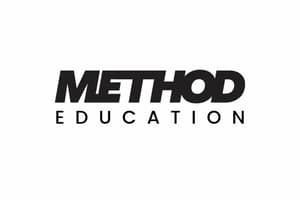Podcast
Questions and Answers
A coaching client consistently misses scheduled sessions and provides vague excuses. Which of the following actions should the coach take first to address this issue effectively?
A coaching client consistently misses scheduled sessions and provides vague excuses. Which of the following actions should the coach take first to address this issue effectively?
- Impose a financial penalty for each missed session to discourage future absences.
- Ignore the behavior, assuming the client will eventually adjust.
- Schedule a direct conversation with the client to understand the reasons behind the missed sessions and collaboratively find solutions. (correct)
- Terminate the coaching relationship immediately due to lack of commitment.
In a coaching relationship, what is the MOST effective way for a coach to handle a situation where they realize their expertise is insufficient to fully support a client's specific needs?
In a coaching relationship, what is the MOST effective way for a coach to handle a situation where they realize their expertise is insufficient to fully support a client's specific needs?
- Refer the client to another professional who specializes in the specific area of need, while openly communicating the reason for the referral. (correct)
- End the coaching relationship abruptly without explanation to avoid appearing incompetent.
- Continue coaching, focusing on aspects within their expertise and avoiding the areas of need.
- Attempt to learn the necessary skills quickly, without informing the client.
A client expresses frustration with their lack of progress towards a long-term goal, despite consistent effort. Which question would be MOST effective for the coach to use in this situation?
A client expresses frustration with their lack of progress towards a long-term goal, despite consistent effort. Which question would be MOST effective for the coach to use in this situation?
- "Are you sure you're really putting in enough effort?"
- "What small, specific steps can we identify that you can take this week to move closer to your goal, and what support do you need?" (correct)
- "Why haven't you achieved your goal yet?"
- "Have you considered that this goal might not be right for you?"
Which of the following scenarios BEST exemplifies a coach establishing a safe and non-judgmental space for a client?
Which of the following scenarios BEST exemplifies a coach establishing a safe and non-judgmental space for a client?
A coaching client has difficulty articulating their goals and aspirations. Which of the following approaches would be MOST effective for the coach to use?
A coaching client has difficulty articulating their goals and aspirations. Which of the following approaches would be MOST effective for the coach to use?
How should a coach MOST effectively integrate the principle of client responsibility into the coaching process?
How should a coach MOST effectively integrate the principle of client responsibility into the coaching process?
In what way does constructive feedback contribute to the client's progress in a coaching relationship?
In what way does constructive feedback contribute to the client's progress in a coaching relationship?
How should a coach handle a situation when a client is not making progress towards their goals despite sincere effort and engagement in the coaching process?
How should a coach handle a situation when a client is not making progress towards their goals despite sincere effort and engagement in the coaching process?
What is the PRIMARY reason confidentiality is paramount in a coaching relationship?
What is the PRIMARY reason confidentiality is paramount in a coaching relationship?
Which of the following actions BEST demonstrates a coach’s commitment to transparency in the coaching process?
Which of the following actions BEST demonstrates a coach’s commitment to transparency in the coaching process?
Flashcards
Trust and Rapport
Trust and Rapport
The foundation of a successful coaching relationship, built on empathy, interest, and active listening.
Roles and Responsibilities
Roles and Responsibilities
Coach guides and supports; client engages, sets goals, and acts. Clear expectations prevent misunderstandings.
Collaborative Goal Setting
Collaborative Goal Setting
Goals are client-driven, specific, measurable, achievable, relevant, and time-bound.
Active Listening
Active Listening
Signup and view all the flashcards
Empowering the Client
Empowering the Client
Signup and view all the flashcards
Handling Challenges
Handling Challenges
Signup and view all the flashcards
Study Notes
- Focuses on building strong partnerships between coaches and clients.
- Emphasizes the importance of mutual trust, respect, and shared understanding in achieving coaching goals.
Establishing Trust and Rapport
- Foundation of any successful coaching relationship.
- Coaches should demonstrate empathy and genuine interest in the client's well-being.
- Active listening skills help the coach understand the client's perspective and build rapport.
- Creating a safe and non-judgmental space encourages open communication.
- Transparency about the coaching process, including methods and expectations, builds trust.
- Confidentiality is paramount.
- Initial conversations focus on getting to know the client, their values, and experiences.
- Coaches share their own background and coaching philosophy to establish credibility.
Defining Roles and Responsibilities
- Coach’s role is to guide, support, and facilitate the client’s growth, not to provide answers.
- Client is responsible for actively engaging in the process, setting goals, and taking action.
- Clear expectations prevent misunderstandings.
- Mutually agreed-upon goals and outcomes ensure both parties are aligned.
- Coaches help clients identify their strengths and resources.
- Coaches teach clients to overcome obstacles and develop strategies for success.
- Open communication is essential for addressing challenges and adjusting the coaching plan as needed.
Collaborative Goal Setting
- Client-driven.
- Coach facilitates by asking powerful questions and helping the client clarify their aspirations.
- Goals should be specific, measurable, achievable, relevant, and time-bound (SMART).
- Ongoing evaluation of progress.
- Flexibility to adapt as the client evolves.
- Breaking down large goals into smaller, manageable steps increases motivation.
- Celebrating small wins along the way reinforces positive behavior.
- Discussing potential obstacles and developing contingency plans.
- Encouraging self-reflection and awareness.
Communication Strategies
- Active listening involves giving the client full attention, summarizing, and asking clarifying questions.
- Open-ended questions encourage the client to explore their thoughts and feelings.
- Powerful questions challenge assumptions and promote new perspectives.
- Non-verbal communication, such as body language and tone of voice, significantly affects interaction.
- Providing constructive feedback is essential for growth.
- Direct communication addresses issues and celebrates successes.
- Encouraging the client to express their needs and concerns fosters a collaborative environment.
- Regular check-ins help maintain momentum and address any emerging issues.
- Clear and concise language helps avoid misunderstandings.
Empowering the Client
- Focuses on building the client's self-efficacy and independence.
- Encourage the client to take ownership of their goals and actions.
- Support the client in identifying their strengths and developing their potential.
- Help the client build confidence.
- Provide resources and tools that support the client’s growth.
- Celebrate the client’s successes and milestones.
- Use challenges as opportunities for learning and development.
- Support the client in building a support system outside of coaching.
- Encourage self-reflection and continuous learning.
- Help the client develop problem-solving skills.
Handling Challenges
- Conflict or misunderstandings can arise even in strong coaching relationships.
- Be willing to address any issues that arise and to find mutually agreeable solutions.
- Address conflict directly and constructively.
- Be open to feedback and be willing to adjust the coaching approach as needed.
- Maintain a focus on the client’s goals and well-being.
- Refer the client to other professionals if necessary.
- Seek supervision or mentoring from experienced coaches.
- Use challenges as opportunities for growth.
- Be patient and persistent in working through difficult situations.
- Regularly assess satisfaction with the coaching process and make adjustments as needed.
Studying That Suits You
Use AI to generate personalized quizzes and flashcards to suit your learning preferences.




